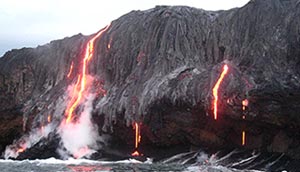How Volcanoes Change the World
Most volcanic explosions are local events, but Earth’s volcanic system has produced global changes from the start. In fact, an Earth without volcanoes would be a pretty lonely place.
|
|
|||
 |
Digging DeeperFind out more about |
||
|
|
|||
Very early in the planet’s history, massive and frequent eruptions created the vital conditions for life to exist. The explosions freed carbon dioxide and other gases that were in the ground to form an atmosphere. The atmosphere held in heat and allowed rain to fall. Fueled by the Sun and carbon dioxide—the process of photosynthesis—plants thrived. Volcanoes fertilized those plants by spreading ash, which is rich in nutrients—phosphorus, potassium, and magnesium.
Today, volcanic lands are still some of the most fertile lands on Earth. Farmers risk living in the shadow of a volcano to yield productive crops—which explains why volcanic areas can be surprisingly populous.
|
In many parts of the world cities and towns have been built close to volcanoes. On the island of Lipari, the volcanoes are relatively quiet, so the residents have built houses further and further up the mountain. |
|
|
The hot lava from Hawaii’s volcanoes is cooled instantly when it reaches the ocean, causing it to explode into little sandy bits. This creates the famous black sand of the island. |
|
The direction of the ash plume from Japan’indicates the larger direction of the winds in that area. |
Volcanoes also help regulate Earth’s global climate. In contrast to global warming, massive explosions like Krakatau or Pinatubo cool the planet for a few years. They unleash high clouds of ash and dust that circle in the upper atmosphere, blocking some of the Sun’s energy.
That ash can disrupt the modern world in other ways. Airplanes flying through clouds of volcanic ash can stall, as the engines get clogged with debris. Because of this, flights may be grounded. Iceland’s Eyjafjallajokull volcano, located under a glacier, erupted on April 13, 2010, and sent large plumes of ash airborne. However, many airplanes fly across Iceland as they travel from Europe to North America, and on to other destinations around the world. Because of the danger of clogged engines, these flights were cancelled for days, forcing major disruptions in world air travel.
The products of volcanoes are useful. Volcanoes move diamonds and metals toward the surface. Galeras in Colombia even spit up gold! Countries such as Iceland depend on volcanoes to provide geothermal energy—drawing heat from the natural furnaces below ground.
Finally, don’t underestimate the power of beauty. Volcanoes are some of the most stunning natural wonders on Earth.
|
|||||||||||||||||||||||||||||||||||||||||||||||||||||||||||||||
This content has been re-published with permission from SEED. Copyright © 2024 Schlumberger Excellence in Education Development (SEED), Inc.




